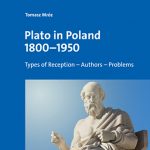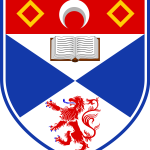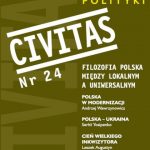Home » Posts tagged 'W. Lutosławski' (Page 2)
Tag Archives: W. Lutosławski
Lewis Campbell and His International Connections

Studia Historiae Scientiarum, an annual journal published by Polish Academy of Arts and Sciences, includes a section Science beyond Borders. In 2018 a paper by Tomasz Mróz was published there on Lewis Campbell’s (1830–1908) correspondence held in Peterhouse Library, Cambridge.
The paper presents L. Campbell, his research on Plato, and the collection of letters sent to this Scottish scholar by: James Martineau (1805–1900), William Hepworth Thompson (1810–1886), Paul Shorey (1857–1934), Wincenty Lutosławski (1863–1954), Eduard Gottlob Zeller (1814–1908), Franz Susemihl (1826–1901), and Theodor Gomperz (1832–1912). This collection supplements the knowledge of the research on Plato’s dialogues at the turn of the 20th century, since Plato scholars in their letters touched on the issues relating to the methods and results of the research on the chronology of Plato’s dialogues. They made judgements concerning the works of other academics, they sent to each other their own publications, and reported on the progress of their studies. They also did not shy away from making personal remarks and communicating personal reflections.
Publishing this paper was preceded by a research stay in Cambridge in June and July 2016, which was sponsored by Lanckoroński Foundation. Additionally, archival materials from St Andrews University Library (Special Collections) supplemented the whole work.
The paper in Polish is available on the journal’s website here.
A View of Plato’s Paths in Poland

A lengthy, 480 pages, monograph book by T. Mróz was published in Academia Verlag’s series “Academia Philosophical Studies” as vol. 75. The title of the book is Plato in Poland 1800-1950. Types of Reception – Authors – Problems.
Some material from the book, including table of contents, is available on publisher’s website. The book attempts to make Polish Plato reception available to non-Polish readers. The years 1800-1950 cover essential phaenomena in modern Polish philosophy, for they encompass periods of reception of Western philosophical trends and the development of the Lvov-Warsaw school, neo-Messianism and neo-Scholasticism. The book discusses how each of these phaenomena contributed to interpreting Plato. The material is divided into three main parts focused on various types of reception.
The book is a final outcome of a project sponsored by Polish government within the National Programme for the Development of Humanities funding scheme. An essential collaborator in this project was Una Maclean-Hańćkowiak, who patiently edited the author’s style.
Platonic Concept of Reincarnation in Polish Philosophy

The latest issue of “Studia z Historii Filozofii” (Studies in the History of Philosophy, vol. 12, iss. 1) includes a paper by Adrian Habura on an episode in Polish reception of Plato’s theory of reincarnation or transmigration of souls.
Habura aims to present Stanisław Lisieckiʼs interpretation and assessment of Plato’s concept of metempsychosis, and then position his work against the background of diverse results of W. Lutosławski and P. Siwek. Lisieckiʼs reflection on Plato, and especially on his theory of reincarnation, proves that he was an unfairly forgotten scholar, who had had knowledge, capabilities and diligence sufficient to grant him a well-deserved place in Polish historiography and reception of Greek philosophy. Due to an unfortunate set of circumstances, including Lisiecki’s abandonment of Catholic clergy and his uncertainty of the value of his own work, he worked on margins of Polish academic life in the interwar period. Yet, as far as it was possible, he attempted to reconcile Platonism and Christian thought and find consolation in a perspective of future incarnations.
Full paper, in Polish, can be downloaded from the journal’s website here.
Plato between Scotland and Poland

In 2018 “Journal of Scottish Philosophy” (vol. 16, iss. 2) published a paper which was not, in fact, discussing Scottish philosophy as such, but was devoted to an episode in history of historiography of ancient philosophy and classical studies in Scotland.
The title of the paper clearly defines its topic: Scottish-Polish Cooperation on Plato at the Turn of the Twentieth Century. This paper discusses an example of Scottish-Polish cooperation on research, undertaken at the turn of the twentieth century, into the dialogues and philosophy of Plato. Two scholars were involved in this research: the Scottish classical scholar and historian of ancient philosophy, Lewis Campbell (1830–1908), and the Polish Plato scholar and philosopher, Wincenty Lutosławski (1863–1954). Their research on the chronology of Plato’s dialogues is analysed and the reception of their works discussed. The paper is enriched with some excerpts from their correspondence.
Unfortunately, the paper is not accessible on the journal’s website. If anyone, however, would like to receive an offprint, feel free to email the author: T.Mroz@ifil.uz.zgora.pl
Censorship against Plato Scholars and Plato Himself

A volume on various aspects of relations between censorship, politics and oppression was published in 2018 by Gdańsk University Press. The book was a result of an international conference which took place in Gdańsk in 2017.
A paper by T. Mróz, included in this collective volume, discusses three cases of censorship on works of Polish Plato scholars who were active in three various periods of Polish history. First, the title of W. Lutosławski’s book on Plato was shortened by Imperial Russian authorities in Warsaw, they removed the word “socialism” from the title of his book on Plato. Its final version was then reduced to “Plato as the Creator of Idealism”.
S. Lisiecki, in turn, translated dialogues and wrote extensive introductions to them, but only his Republic saw the light of day in the interwar period, while all the remaining dialogues were left unpublished (but some of them, fortunately, will be published this year!). His leaving the clergy and Roman Catholic church might have been one of the reasons of his difficult situation in Polish academia.
Finally, W. Witwicki’s translation of the Republic with his commentaries appeared in print in 1948. After his death, the second edition was published in 1958, but some of his ironic and critical remarks on totalitarian system were removed.
Paper by T. Mróz can be downloaded from the University’s repository here.
Polish historians of Greek philosophy and their journeys to Athens

It comes as no surprise that experts in Greek philosophy and literature, classic scholars, or historians of the ancient world ache to visit the monuments of ancient history and to touch the relics of the Greek past. Many scholars were able to fulfill this dream and to undertake a journey to visit Athens and dwell the streets to search for Socrates or to have a discussion with the spirit of Plato in Academic garden.
Such journeys resulted very frequently in books or papers, memoirs or historical guides, that included their authors’ noble hopes and high expectations, but also their disappointments and grievances that Greek and Athenian reality at the turn of the 20th century could not meet their image of classical beauty and spiritual harmony.
In his paper in Polish, T. Mróz presented the works of four Polish authors who were experts in Greek literature and philosophy, who published extensively on this subject and who were sufficiently wealthy to travel to Greece, and to Athens in particular. In chronological order of their journeys, they are: Wojciech Dzieduszycki, Wincenty Lutosławski, Tadeusz Sinko and Władysław Witwicki. Their journeys took place between 1874 and 1937.
The paper can be downloaded here, and “Civitas” table of contents is here in English and here in Polish.
Lewis Campbell and his Plato

A paper on Lewis Campbell (1830-1908), who was an iconic figure of St Andrews and Scottish Platonism, appeared in a collection of papers from an International Society for Neoplatonic Studies annual conference in Olomouc in 2017. The volume was published in 2019 and includes papers on ancient, mediaeval and modern interpretations of Platonism (contents of the book on the Prometheus Trust website). In his paper T. Mróz examined the history of the most significant works by Campbell, his studies and editions of the dialogues, and attempted to present the consequences of his conclusions for interpreting Plato’s philosophy.
The paper is free to download from the University’s repository here.
Recent commentaries